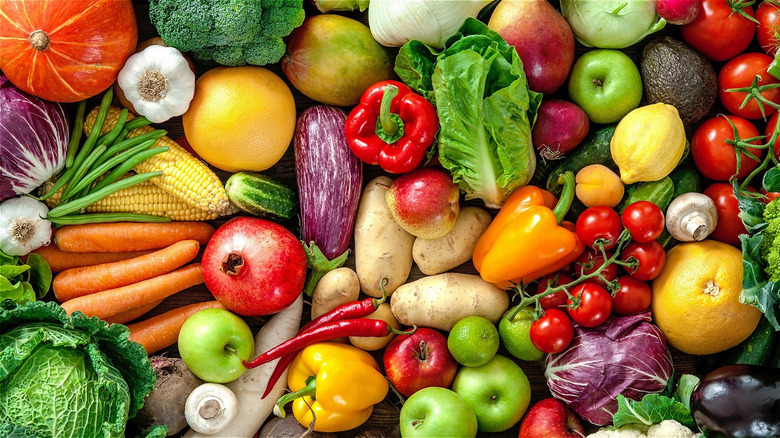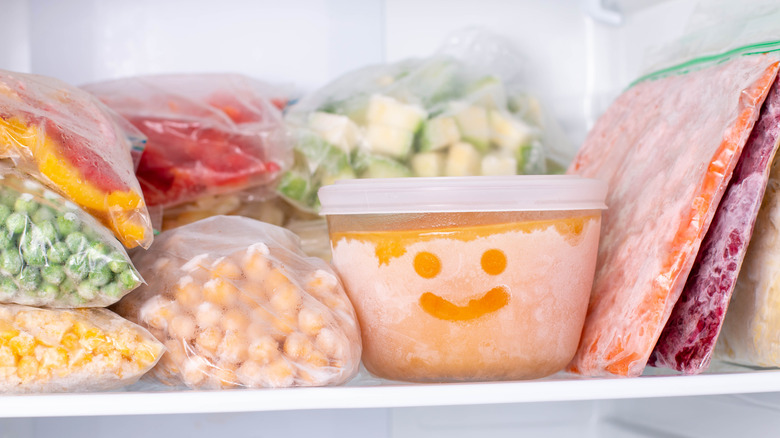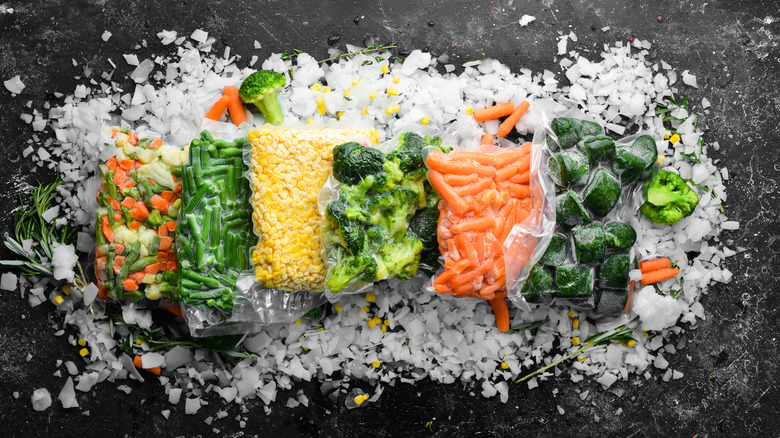The Mistakes You're Making When Freezing Fresh Produce
If you happen to have accidentally purchased too much perishable food during your last shopping trip, that doesn't necessarily mean it all has to go to waste. Freezing is a great way to preserve food and keep it from spoiling, making it a great option for extending the life of your excess groceries, especially fresh fruits and vegetables. Freezing works by turning the moisture in the food into ice crystals, which slows down the spoilage process and inhibits the growth of potentially harmful microorganisms, without affecting the nutritional content of the food, according to The European Food Information Council.
However, while freezing can be a lifesaver for preserving food, there are do's and don'ts to properly storing produce in the freezer. Recently, Stephanie Harris-Uyidi, professional chef and founder of The Posh Pescatarian, spoke with Mashed to share her best tips for making sure your fresh fruits and vegetables keep their taste and quality after you've put them in the freezer.
Produce should be frozen when it is perfectly ripe
Harris-Uyidi explained that one of the most common mistakes people make when they freeze produce is freezing it at the wrong time. Fruits and vegetables that are overripe are generally not good candidates for freezing, while food that is frozen when it is underripe will lack flavor once it is finally consumed. "One thing that people should know is that you should avoid preserving produce that has passed its prime; the one exception would be bananas or plantains since these fruits have great uses once slightly overripe (think banana bread). For best results, freeze fruits and vegetables that are ripe so that they maintain good flavor once frozen. For example, freezing unripe pineapple will result in bland and faint flavor when used," she explained to Mashed.
Of course, any fruits or vegetables that are already starting to turn or get close to rotting should be tossed and not be salvaged in the freezer. Also, if you are unsure if some of your frozen produce is safe to eat, check to see if it has a dull color, an abundance of white-colored ice, freezer burn, or an otherwise frostbitten appearance, according to Feed Family For Less. This likely means the food has gone rotten in the freezer and is not good to eat.
Not every type of food keeps well in the freezer
The ripeness of the produce isn't the only thing to take into consideration when popping your groceries in the freezer. The type of container the items are stored in also plays a big role, with airtight storage being the best option, as Harris-Uyidi explained. "My preference is to use airtight freezer bags, which are affordable and readily available. My favorite combination is to pre-freeze and use my vacuum sealer to ensure an airtight seal," she told Mashed.
But even if you have the perfect airtight contains, not every fruit or vegetable does well in the freezer. Harris-Uyidi warns against freezing fruits with a very high water content, like watermelon, since "it can turn to mush when thawed." Eggplant is another food that can also be difficult to freeze well. "If you must freeze eggplant, I'd recommend baking, blanching, or grilling it first to help preserve the flavor and texture," she suggested.
If you happen to still have too many fruits and vegetables that aren't good candidates for freezing, that doesn't necessarily mean they'll end up going to waste. Instead, Harris-Uyidi recommends another option: canning. "If you have an abundance of unripe fruit or vegetables that must be preserved, say, if you have an overrun garden or gifted an abundance, I'd recommend canning. Canning is a fun way to preserve produce in brine, sugar, or syrup, but that's a whole other topic!" she explained.


